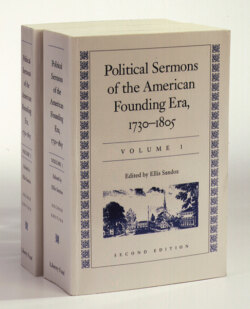Читать книгу Political Sermons of the American Founding Era: 1730–1805 - Группа авторов - Страница 42
На сайте Литреса книга снята с продажи.
ОглавлениеTHE DEDICATION
To the Right Honorable William Pitt, Esq.
One of His Majesty’s Most Honorable Privy Council,
and an Illustrious Patron of America
Sir,
Did not a wide ocean intervene, the author of the ensuing discourse would not presume to prefix so great a name to a little performance of his, without first humbly requesting the indulgence, and obtaining it. Nor would he trust to the sufficiency of that apology for taking this liberty, did not some persons perswade him to hope, it will be kindly and condescendingly taken as a testimony of that sincere gratitude and high veneration, which not only he but his country has for one, who hath twice at least been a principal instrument in the hand of GOD, of saving Great Britain and her colonies from impending ruin: Once, by magnanimously conducting a just and glorious war against foreign nations; and once, by preserving peace in his own; by exerting himself to prevent a fatal rupture between Britain and her colonies, and to re-establish such an harmony as essentially concerns the welfare of both.
At the late most important crisis, you, sir, whom no rewards could ever tempt, no frowns of the great ever dismay, no dangers disconcert; and to whom, so good and great in yourself, no titles, however high, could possibly add any new dignity or lustre; you, great sir, was not “ashamed of our chain,” or reluctant at standing forth to plead the cause of poor America; and to stem the mighty torrent that was against her, which threatened to end in a deluge of blood! When it was accounted criminal by many, even to lisp but a broken word or two in her favor, you, sir, was not ashamed or afraid to pour forth all your unrivall’d eloquence in a strenuous vindication of her infringed rights. And, indeed, her cause being supposed good, the more friendless she was, the more she needed, and in some sort deserved, so powerful a patronage. For, surely, great talents were given for great occasions; to be employed in defence of the innocent and feeble. GOD made some men strong, on purpose to “bear the infirmities of the weak”; that they might be able to assist and support them in their dangers and extremities; as you, sir, have ever done, since you adorned the British senate; and particularly in a late ever-memorable instance.
To you, great sir, under GOD and the king, grateful America chiefly attributes it, that she is now happily re-instated in the enjoyment of her former liberties and privileges; tho’ she has, at the same time, a very deep sense of her obligations to other great and illustrious personages.
If, sir, you could, at this distance, have an adequate conception of the universal joy of America, preceeded by the most alarming apprehensions for her liberties: If you could be fully sensible how much we ascribe it to you, that they are not lost; how, next to the king, we bless you as our common father, and send up ardent vows to heaven for you; this would, it must give you a sublime, and truly godlike pleasure. It might even suspend, for a while, the severest pangs of that excruciating disorder, which has so often detain’d you from the British senate, to the great detriment of the public; particularly when the late dreadful Stamp-Act was passed. Nay, it might, perhaps, without any other miracle, give you such spirits and vigor, as to “take up your bed and walk,” like those sick and lame persons instantly cured by the word of him, who came from heaven to make us “free indeed.”
So universal, so great is our joy; and so much, sir, are we indebted for it to your good offices! But, alas! what can poor America do in return? Nothing but acknowledge the obligation with as much sincerity as a grateful country ever acknowledged one: Nothing but call you, over and over again, her father, her father; and endeavour to make good your generous engagements for her prudent, dutiful behaviour towards her mother-country: Nothing but erect a few marble, brass or copper statues in honor to you (for America has but little silver or gold); statues that will be of no service to you, since they will go to decay long before your name and memory will need any such poor helps to preserve them.
Alas! America can do no more! Yes, sir, there is one thing more: She will pray that you may long live in health, happiness and honor, that if there should be any occasion hereafter, as in time past, you may step in and prevent her’s and Britain’s ruin, when no other man could; and that, when you must, according to the common lot of men, however great and good (O may it be late!) cease to plead the cause of liberty on earth, you may in heaven, as your reward, enjoy “the glorious liberty of the sons of God”!
I am, with the warmest gratitude, and highest veneration, right honorable and most worthy
sir,
your most obedient,
most dutiful
and most humble servant,
Jonathan Mayhew
